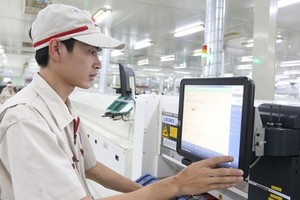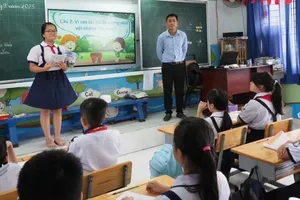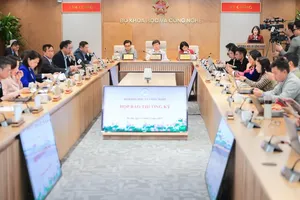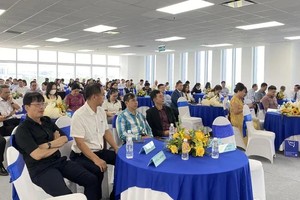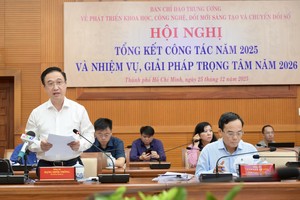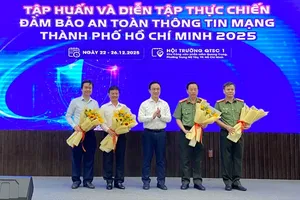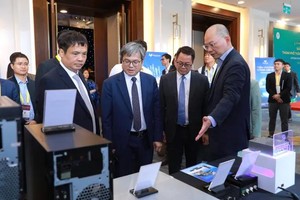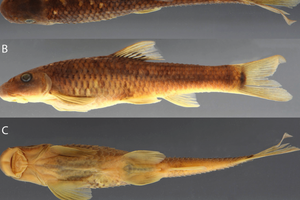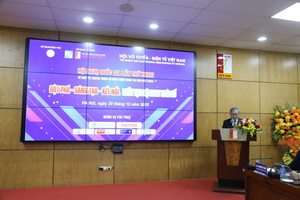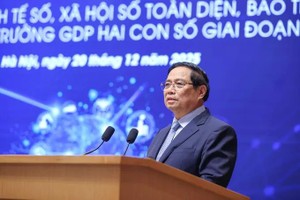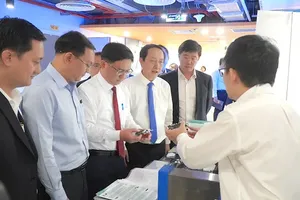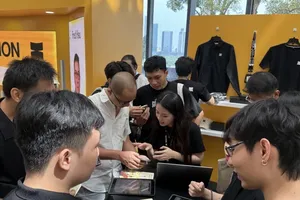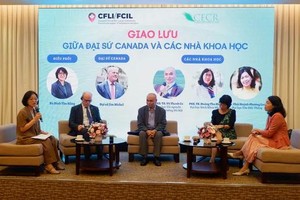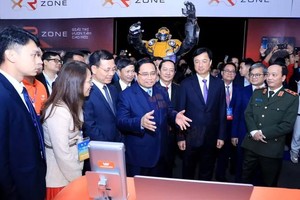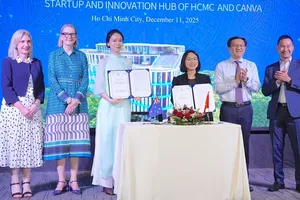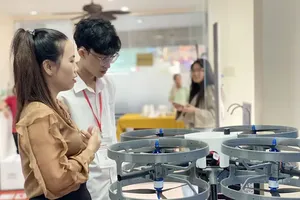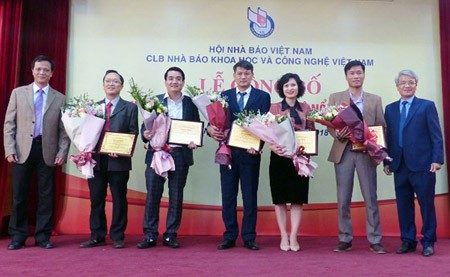
This is the 13th consecutive year the Club's 60 members have voted to select the top ten events related to the fields of policies, natural sciences, social sciences and humanities, applied research, globalization, and scientist honoring.
The top-ten list consists of:
1. On January 1, 2018 in Hanoi, the project ‘Digitized Vietnamese Knowledge System’ was formally launched, chaired by Deputy Prime Minister Vu Duc Dam. This system, aiming at ‘Sharing knowledge – Fostering innovation – Connecting communities – For the better future of the Vietnamese’, is a comprehensive information storage in all fields for the public to learn and master new knowledge, leading to a boost for research and creativity, along with successful implementation of advanced technologies into developing the nation. This is considered the foundation for marvelous opportunities for innovative startup activities in Vietnam.
2. Doctor Tran Dinh Phong, Head of the Fundamental and Applied Sciences Department in the University of Science and Technology of Hanoi (USTH), won the 2018 Ta Quang Buu Award for his research in the physics field entitled ‘Coordination polymer structure and revisited hydrogen evolution catalytic mechanism for amorphous molybdenum sulfide’.
Since the beginning of this century, when clean energy has gradually become one of the most concerned topics in the world, researches on artificial leaves that are able to convert sunlight and water into hydrogen have attracted numerous scientists. The catalyst for this chemical reaction is the rare, precious, and expensive platinum. The research of Dr. Phong and his collaborators has effectively demonstrated the structure and mechanism of amorphous molybdenum sulfide, an easy-to-fabricated, low-cost material as an alternative to platinum for the hydrogen evolution reaction from water. This is a breakthrough in the race to find an energy solution that can reduce CO2 emission in the air.
3. For the first time, Vietnamese scientists has shockingly discovered remains of accommodation of pre-historic people in volcanic caves, showing the adaptation of residents in the Basalt land of the Central Highlands region as well as the milestone in anthropology / paleoanthropology study in Vietnam through the project coded TN17/T06 ‘Researching the Values of Cave Heritage, Proposing the Construction of On-site Preservation Museum in the region, with the Example of Krong No Volcanic Caves in Dak Nong Province’, carried out from August 2017 to August 2020. The human remains in limestone caves in Vietnam or other regions in the world are quite popular, yet there is no such announced finding in volcanic caves.
This is the first human remain discovered in a Vietnamese / Southeast Asian volcanic cave, which is globally rare. It has provided persuasive scientific grounds for the reconstruction of the prehistoric people’s daily activities, and urged the building of an international Geopark in Dak Nong Province.
4. On October 21, in London, the software to calculate charge in real-time ‘vOCS 3.0’ of the Military Industry and Telecoms Group Viettel received the ‘Best Product or Service of the Year’ Award at the International Business Stevie Awards. This software is highly appreciated thanks to its creativity and great effects on a large number of customers.
At the moment, vOCS 3.0 has been used in 11 nations in the world, possessing around 170 million mobile subscribers. This software is remarkable in that it can customize an individual package for each user, helping it to be easily applied in various markets in the world.
5. The Center for High Technology Development under the Vietnam Academy of Science and Technology has successfully developed a snow ice generator from sea water. It is light, durable, and has a simple structure, which is absolutely suitable for Vietnamese fishing boats. What is more, it is easily maintained or repaired.
This snow ice generator is made from materials that can resist salt corrosion. Users can comfortably select or adjust the density of snow ice in accordance with a certain temperature. Different from the traditional freshwater snow ice, this new snow ice is a combination between tiny ice crystals and water, kept in a temperature range between -6 degree to -2 degree Celsius. It can be pumped from a liquid ice creation chamber to storage tanks or compartments on boats.
This snow ice aims at prolonging the seafood preservation time on boats thanks to its low temperature compared to conventional freshwater snow ice and its ability to quickly freeze seafood, greatly increasing its quality and more effectively protecting the environment.
This is the result of a research by MSc. Le Van Luan and his collaborators, which has been recognized as an advanced technology in the field of fisheries by the Ministry of Agriculture and Rural Development.
6. On August 21, Vingroup officially introduced its Supporting Fund for Scientific and Technological Research to finance studies in the fields of computer science, artificial intelligence, robotics, automation, Nano technology, renewable energy, new generations of materials. The fund has an investment of around VND2,000 billion (approx. $85.9 million)
Along with this fund, Vingroup also introduced Vintech Technological Company, Big Data Research Institute, Vin Hi-tech Research Institute, the agreement for human resources training with more than 50 leading universities in Vietnam, the announcement on its plan to become an international group of technology – industry – service. This is a meaningful investment activity of a large private Vietnamese business at the moment.
7. On November 1, the management board of the Hoa Lac Hi-tech Park in Hanoi appointed A Chau Industrial Technology Joint Stock Company to carry out the project ‘A Chau Factory for Hi-tech Electronic Equipment’. These two organizations also co-signed a cooperation agreement with Schneider Electric Group for technology transfer, marking a milestone in manufacturing, managing, and automatically monitoring the energy system.
8. On July 13 in Hanoi, the high-level forum and international exhibition on Industry 4.0 (Industry 4.0 Summit 2018) kicked off, chaired by Prime Minister Nguyen Xuan Phuc, attracting around 2,000 delegates, including 11 ambassadors and representatives of international organizations, over 50 experts of the region and the world, as well as domestic and global business people.
This forum aimed at building suitable policies and regulations so that Vietnam can actively participate in the Fourth Industrial Revolution while propagandizing Industry 4.0 to the general public, providing opportunities for investment in the technological field.
From September 11 to 13, the World Economic Forum on ASEAN 2018 (WEF ASIAN 2018) themed ‘ASEAN 4.0: Business Spirit and Industry 4.0’ was held in Hanoi, with the participation of General Secretary cum President Nguyen Phu Trong, Prime Minister Nguyen Xuan Phuc, and leaders of ASEAN nations, senior managers of partner countries, along with about 1,000 representatives of multi-nation corporations, ASEAN businesses, and 800 domestic companies.
9. On August 8, the International Center for Theoretical Physics (ICTP) gave the 2018 Dirac Medal to three physicists Subir Sachdev from Harvard University, Xiao-Gang Wen from Massachusetts Institute of Technology, and Prof. Dam Thanh Son from Chicago University.
These three scientists are the pioneers in researching how quantum mechanics affects large groups of particles, also known as many-body system. They have found laws on how quantum mechanics affect the activities of very tiny particles, contributed to the discovery of new states of matter besides the traditional gas, liquid, and solid states.
Prof. Dam Thanh Son and his two colleagues have used various kinds of knowledge in many fields like material science, black hole, and cold atoms to research on many-body system to prove the value of the inter-field approach.
10. Dr. Nguyen Thi Hiep, lecturer on biomedical technology of the International University, a member of the Vietnam National University – Ho Chi Minh City, was honored as ‘International Rising Talent’ by the L’Oréal – UNESCO Fund on March 21 in France thanks to her contribution to regenerative medicine.
Her research team is making experiments and tests on the use of bio-glue to optimize its safety and effect in hope of creating a product that can stick right onto any kind of injury to eliminate bacteria and boost the tissue regeneration process. This kind of bio-glue is supposed to form a film to stop bleeding, absorb liquid from the injury, and prevent infection from micro-organism.



